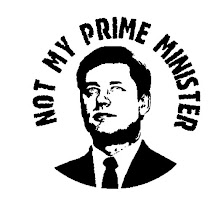CCPA's national office recently released the book: The Harper Record. This book is a comprehensive analysis of the Conservative minority government to date. You can download this book as a PDF file off the CCPA website.
CCPA-Manitoba will be releasing a series of Federal Election Fast Facts called: Five Things You Need to Know About Harper and……..(various topics). The Fast Facts are quick summaries of some of the topics covered in the book such as crime, childcare, civil rights, women, the environment and energy, water, governance and privatization.
Today's Election Fast Facts deals with Stephen Harper's record on human rights - the other topics will be released prior to the election.
ONE:
The United Nations General Assembly last June voted 143 to 4 (with 11 abstentions) in favour of adopting the Declaration on the Rights of Indigenous Peoples. Canada was one of the four countries that voted against it. Indian Affairs Minister Chuck Strahl said Canada didn't support the Declaration because it was "fundamentally flawed...[and] incompatible with Canada's constitutional framework." It was also rejected, he said, because it failed to recognize Canada's "need to balance indigenous rights to land and resources with the rights of others." His excuse reflected the concerns and priorities of a government strongly committed to resource exploitation and corporate interests.
TWO:
Canada is the only developed democracy that has permitted one of its citizens – Omar Khadr -- to remain incarcerated in the U.S. detention camp at Guantanamo Bay in Cuba, where he has been subjected to torture and other harsh treatment. His detention there violates both Canadian and international human rights laws, but the Harper government has consistently refused to make any effort to bring him home. Khadr was a teenager when first imprisoned by the Americans, and child soldiers are entitled under international law to due protection and rehabilitation, not incarceration. The UN's Special Representative for Children in Armed Conflict has publicly deplored Harper's decision to leave Khadr at Guantamano.
THREE:
While former Canadian Supreme Court Justice Louise Arbour served as the UN's High Commissioner for Human Rights, she won praise from many countries and NGOs for her diligence in exposing and condemning human rights violations. She was chief prosecutor in the trial of Serbian leader Slobadan Milosevic for war crimes and secured his indictment. But her outspoken criticism of UN member countries' infringements of human rights, including the use of torture by the U.S. military in Iraq and Guantanamo, drew fire from the Bush administration, and also, shockingly, from the Harper government. When she finished her term as Commissioner, the Harper government was called upon to publicly thank her and salute her record as a defender of human rights. Instead, in the House of Commons, former Justice Minister Vic Toews castigated Arbour and went so far as to call her "a disgrace."
FOUR:
Canada was one of the first countries to sign and ratify the UN Convention Against Torture, in 1987. But Canada's commitment to the treaty came under question when several Canadian citizens, including Maher Arar, underwent torture in foreign jails, evidently with Canadian complicity. Following the Arar Inquiry, the Harper Government issued a manual to Canadian diplomats on how to recognize and oppose the use of torture. It listed several countries that had been found guilty of torture, including the U.S. The manual drew praise from Amnesty International and other human rights advocates, but when the U.S. protested, the Harper government quickly apologized and promised that the manual would be revised to remove the U.S. from its list of nations that torture captives.
FIVE:
Many of the "security" measures introduced by the federal government under pressure from the U.S. after 9/11 have expanded state power at the expense of citizens' rights and freedoms and the rule of law. One of the most offensive is the No-Fly List introduced by the Harper government in 2007. It violates several sections of the Charter of Rights and Freedoms, including mobility, due process, and equality rights, and the right to be free from unreasonable search and seizure. People are put on the list with no prior notice or opportunity for a hearing to learn about and answer the allegations against them. The ban on their flying could impair their ability to earn a living. For them, the Charter of Rights and Freedoms offers no protection or recourse.
Canadian Centre for Policy Alternatives-MB
309-323 Portage Ave Winnipeg, MB R3B 2C1
ph: (204) 927-3200 // fax: (204) 927-3201 // www.policyalternatives.ca
CAW Local 567
Tuesday, September 30, 2008
Five Things You Need to Know About Harper and Human Rights
Labels:
allies,
circulate,
equity,
human rights,
information,
issues,
resistance,
speak out,
we can't let him win twice
Subscribe to:
Post Comments (Atom)


No comments:
Post a Comment